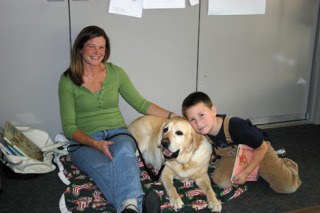Visitors to Chautauqua Elementary School who walk past room 307 might hear the voices of one or two children reading — a common occurrence at an elementary school — but on venturing in, they may find an unexpected scene: soft blankets spread on the floor, an adult on each one resting against the wall and a child sitting on each blanket, too, reading to a dog.
And the dogs, as good dogs do, listen quietly.
The program behind this innovative approach to learning is called Paws to Learn. It began last spring with the golden retriever Newburg and his handler — and force behind the program — Joan Baseleon. It grew in the intervening months and re-opened on Nov. 1 with seven handlers and six dogs. Now, each week, Gizmo, Godiva, Jake, Terrance, Gabriel and Newburg listen as 13 students read to them.
Organizers of the program would like it to grow even more.
“If we had twice as many dogs, I think the slots would be easily filled,” Baseleon said.
Paws to Learn is meant not only to give kids extra reading time, but to help any child who would benefit from a safe, comfortable place for a while, according to Paws to Learn co-organizer Liz Straube.
Baseleon, now a library assistant at both Vashon High School and Chautauqua, was a weekly volunteer with the program in Seattle with her former dog, a miniature poodle named Pooh Bear, when she felt he needed a job after he grew too old to compete in dog shows, she said.
There at the Lawton School, she saw the benefits of the program and shared the story of one girl who was so shy, she kept her head down and barely spoke above a whisper. The girl read to Pooh Bear each week, Baseleon said, and by the end of the year, she sat in front of the class, and read out loud — for all her classmates to hear — with Pooh Bear by her side.
It’s this kind of transformation in children that made Baseleon want to bring the program to Chautauqua after she moved to Vashon full-time.
When approached with the idea, Dean of Students Nancy Herrington welcomed it.
“I thought it sounded great in terms of supporting children,” Herrington said. “I put it out to the teachers and had a really great response.”
Teachers identified several students they thought the program would benefit, according to Herrington, and nearly 20 were interested. But because there was only one dog, some of the children had a chance to read only once or twice before the school year ended, she said. When Herrington asked if two dogs might be possible, Baseleon said she could do better than that.
She and Straube are part of the network of career-change dogs (dogs who are trained to be guide dogs but could not work that way for some reason) and their owners on the Island — a large group, given the work of Char Phillips, who heads the popular guide dog program on Vashon.
“Our intent was to get a program going at Chautauqua and encourage the other career-change dog handlers to do so as well,” Straube said. “Where there was one, we wanted many.”
Considerable training and several months later, the program is well on its way to “many” and seems set to flourish.
Participating kids give their time with the dogs glowing reviews.
One second-grade boy took time from making a construction paper turkey to talk about his feelings.
“I like it,” he said emphatically. “I love reading to the dog because they sit and listen to the words and help you out. When I have trouble with the words, she barks. I say thanks, and then I get the word correct.”
A listening friend was clearly envious.
“Wow,” the friend chimed in, wide-eyed. “You’re lucky!”
Teacher Esther Morrison sees the enthusiasm in her students.
“My second-grade kids that go love it, absolutely love it. They wait at the door. They know when their time is. And wouldn’t we all love to have some kind of being that hangs on our every word?”
One young student mirrored that sentiment. When asked why he likes reading to the dog, he said, “Because he likes me.” When asked if there was any other reason, he thought for a while and said very clearly and seriously, “No.”
The benefits of being around animals are well documented, and the national Reading Education Assistance Dogs program, with which all Chautuaqua’s reading dogs are registered, has found its own benefits, including increased reading ability, decreased absenteeism, improved self-confidence and greater involvement in other activities, according to the Delta Society therapy dog Web site.
Children who do not know how to read are welcome to be part of the program, too, Baseleon said.
“If a special needs child can’t read and comes with a book and tells a story to the dog, that’s good, too,” she said, adding that instilling a love of learning is important.
Straube appreciates what she sees in her weekly volunteer sessions.
“There’s almost an immediate release of tension and stress (in the kids). They stretch out together on the blanket and read. There is a connection that would not be there with a teacher or other adult.”
The sense of accomplishment is good to experience, too, Straube said. One girl was so exited to finish her book, she wanted to celebrate with reading dog Gizmo.
Dean of students Herrington is pleased with what she is seeing.
“For me, it’s all about a child’s perception of themselves, and if forming a relationship with a dog and a volunteer helps them with their reading and other academics, then so much the better.”
As one fifth-grader summed up, “It’s fun.”



